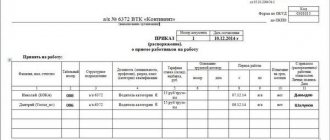Short story
HR Director is a relatively new position included in the staffing table. It appeared in the late 90s of the last century, when Moscow State University began training the first HR specialists of the new generation. The development of HR management is associated with the need of enterprises of any industry and of different sizes for competent selection and staffing.
The predecessors of personnel managers during the Soviet Union were personnel department employees. They mostly dealt with documentation issues, but modern managers have a wider range of responsibilities.
IT technologies
Manual processing of questionnaires is becoming a thing of the past; line-level recruiters are already being replaced by robots. Moreover, the latest trend in HR is the use of neural networks and artificial intelligence. For example, Sberbank piloted an AI that predicts how quickly a candidate will leave the company. This is how the bank plans to reduce costs caused by staff turnover.
The competence of a modern HR director now includes skills in automating processes in HR, selecting the necessary software and creating technical specifications for the implementation of networks and services by IT department specialists.
Definition of profession
HR is an abbreviation of the phrase human resources, which directly translated from English means “human resources”. It is this golden fund that is key for any company, because even the most advanced equipment needs to be managed by a competent specialist.
The HR Director is responsible for the following issues:
- staffing level;
- compliance of hiring and dismissal of an employee with the norms of Labor legislation;
- organization of work of the HR department.
An ordinary manager (and/or recruiter) and a director are two different positions, although a clear distinction between them began to emerge in our country quite recently, and continues to form to this day. Regular HR deals with personnel selection, office work, conducts training and performs other ordinary tasks. It’s easier to find him on his mobile phone - he is rarely at the workplace, as he organizes the search for new employees, conducts interviews and all kinds of corporate events. But the boss sits in his office much more often, since he is coordinating the hiring process.
Budgeting and document management
In addition to innovation and following trends, the HR director will have to deal with classic conservative responsibilities. These usually include:
- Personnel classification, labor regulation.
- Formation of a wage budget, budget for personnel selection and adaptation, training and development.
- Analysis and justification of expenses, defense of the draft budget.
The head of the personnel department is also responsible for current issues of labor relations:
- Creation of internal labor regulations, regulations on payment, regulations on the protection of personal data.
- Formation of staffing and vacation schedules.
- Creating a system for the work of the personnel department - working with work books, orders, labor protection materials, time sheets and personal cards.
- Development, together with lawyers, of a collective agreement, GPC agreement, and agreement with the self-employed.
- Formation of a system of disciplinary sanctions and job descriptions.
Additionally, it is necessary to establish a system for monitoring innovations in legislative acts and orders of Rostrud. The HR Director also deals with inspections of the Labor Inspectorate - his tasks include preparing for inspections and studying the procedural work of inspectors.
Education
Since director is a position, not a profession, university graduates are unlikely to be able to apply for this full-time position immediately after graduation. But a higher education diploma is required to start a career. It can be both humanitarian and technical. Most often, good personnel managers come from graduates of historical, sociological, psychological, and economic faculties.
If you have definitely decided that working with human resources is your calling, pay attention to educational institutions that train HR managers, for example:
- Institute of Business and Business Administration RANEPA;
- Russian New University;
- South Ural State University;
- St. Petersburg State Economic University, etc.
To enter a specialty in personnel management, you must pass the Unified State Exam in the following subjects: mathematics, Russian, social studies, English.
Responsibilities
The job responsibilities of the HR director are determined by the specifics, field of activity and individuality of the organization. They are influenced by factors such as the size of the company and the recruitment department, and success. But generally speaking, this specialist performs the following job responsibilities:
- manages the personnel selection service;
- analyzes the labor market;
- creates a favorable environment for maximum work efficiency;
- develops, studies and implements new technologies in the personnel management system;
- develops, reviews and prepares documentation;
- controls the work of the subordinate department and reports on the results to senior management;
- improves employee selection methods and develops new screening methods;
- increases the level of qualifications, promotes the professional growth of subordinates and controls the planned budget for training;
- determines the required number of employees and forms a reserve;
- supervises personnel records management.
Job responsibilities
At many enterprises, the HR director is considered the second person after the CEO or founder. In a sense, this is true, because it depends on him whether there will be staff turnover in the organization, how effectively the staff will be able to work and develop, whether the regulatory authorities will show increased interest in the company due to requests from employees claiming, for example, that they are illegally fired.
The HR Director performs the following functions:
- manages an HR department or department;
- thinks over and implements the organization’s personnel policy;
- develops and draws up payment schemes, benefits and compensation, bonuses and fines;
- controls the staffing and reserve levels;
- draws up schedules for internal and external staff training, adaptation of new employees;
- plans to promote employees;
- calculates and controls the company's expenses for staff maintenance.
The HR director can participate in the selection of employees for top positions and be responsible for the development of a corporate training center (these are often organized at large enterprises).
The job description of the HR director also involves creating a favorable socio-psychological environment in the team. Ideally, if the specialist is impartial, this will allow him to objectively evaluate each employee and the entire staff.
KPIs for HR
When developing a strategy, special attention is paid to key HR performance indicators to track department performance. The functions of the HR director include monitoring employees and all processes related to human resources in the company.
Here are some examples of KPIs that are used in large enterprises:
- Personnel productivity coefficient is a metric that shows how effectively the specialists attracted by HR work.
- Satisfaction Index - researched using anonymous surveys. Affects the level of staff turnover.
- Employee innovation index - how often specialists offer new solutions, what percentage of initiatives are implemented.
- Quality and quantity of growth - how effectively the grading system developed by the HR department works.
- Payroll share is the efficiency of personnel costs in relation to the company’s turnover or income.
- HR quality is an indicator that is calculated from surveys of heads of other departments. Demonstrates how well the recruited talent matches the needs of the business.
- Attrition rate is a metric that shows the percentage of employees who leave after being hired within 90 or 365 days.
There are several dozen important metrics that should be tracked in HR. KPIs should be implemented taking into account the company's strategy. For example, the founder of the Academy of Innovation in HR, Eric van Vulpen, believes that if the company’s goal is savings, then the HR director should set the main KPI to reducing the cost of hiring. If the goal is growth and development, then the emphasis should be on innovation and learning.
Personal qualities
Many people believe that the main requirement for a HR director is to have the skills of a psychologist. This is partly correct, but only in the context of all other qualities. After all, a competent leader should consider people not as individuals with all their anxieties and experiences, but as working units that can be useful or useless for the enterprise.
The ideal candidate for the position of HR director should be self-confident, able to make decisions independently and bear responsibility for them. It also wouldn't hurt to:
- analytical thinking;
- well-delivered correct speech;
- the ability to separate the main from the secondary;
- high level of self-learning;
- diplomatic skills.
Since the HR director has to perform responsibilities not only for hiring, but also for dismissing top managers, he must be stress-resistant. It is very important to be able to tell an employee why the company no longer needs his services.
In general, applicants for the position of HR director are expected to have at least three years of work experience, including in management positions; knowledge of the legislative framework necessary for registration and calculation of employees; mastery of modern personnel management technologies.
Job description of the organization's HR director
1. GENERAL PROVISIONS
1.1. This job description defines the functional duties, rights and responsibilities of the HR Director (name of the organization in the genitive case) (hereinafter referred to as the Company).
1.2. The HR Director is appointed and dismissed in accordance with the procedure established by the current labor legislation by order of the head of the Company.
1.3. The HR Director reports directly to (name of the position of the immediate manager in the dative case) of the Company.
1.4. The HR Director belongs to the category of managers, heads the personnel work of the Company and is subordinate to:
- Human Resources Department;
— control department;
— recruiting department;
— department of adaptation and motivation.
1.5. The HR Director is responsible for:
— proper organization of work to provide personnel of the required number and qualifications in accordance with the needs of the Company;
— performance and labor discipline of personnel service employees;
— safety of information (documents) containing information constituting the Company’s trade secret, other confidential information, including personal data of the Company’s employees;
— ensuring safe working conditions, maintaining order, complying with fire safety rules in the premises of the personnel service.
1.6. A person with a higher professional education and professional experience in management and other positions in human resources for at least 5 years can be appointed to the position of Deputy Director for Human Resources.
1.7. In practical activities, one should be guided by:
— legislation, regulations, as well as local acts and organizational and administrative documents of the Company regulating personnel work and the activities of the personnel service;
— Internal labor regulations;
— labor protection and safety rules, ensuring industrial sanitation and fire protection;
— instructions, orders, decisions and instructions from the director of the organization;
- this job description.
1.8. The HR director must know:
— legislation, regulations on the organization of personnel work;
— organizational structure, personnel composition of the Company, its profile and specialization, as well as the goal and development strategy;
— current and future needs of the Company for personnel in the category “deputy head of division” and above, methods of their planning and forecasting;
— the tasks of the personnel service to meet the Company’s needs for personnel of the appropriate size and qualifications, its capabilities to solve these problems;
— methods for analyzing the state of the Company’s personnel potential, material and other resources required to maintain it at the appropriate level;
— the procedure for the formation, qualification and numerical composition of the personnel reserve for the most in demand (scarce) specialties (categories);
— the state of the labor market, the possibility of using the organization’s information resources in the interests of the tasks of the personnel service;
— the procedure for concluding employment contracts, tariff agreements and additional agreements to them;
— the procedure for resolving individual and collective labor disputes;
— modern theories of organizing personnel work;
— advanced domestic and foreign experience in organizing personnel work;
— composition and structure of the Company’s personnel documentation;
— management (to the extent required for effective management of the personnel department), business etiquette, rules for conducting business correspondence on personnel matters;
— means of computer technology, communication and communications;
— rules and regulations of labor protection.
1.9. During the temporary absence of the HR Director, his duties are assigned to (name of the deputy position).
2. FUNCTIONAL RESPONSIBILITIES
The HR Director is required to perform the following labor functions:
2.1. Lead the personnel work in the organization (enterprise), the personnel service and confidently manage its activities.
2.2. To create optimal conditions for the timely and high-quality implementation of the daily tasks assigned to it by the personnel service in strict accordance with the approved work procedure (regulations) and the Company’s personnel management technology.
2.3. Manage the work on the formation of personnel policy and personnel strategy, determining its main directions in accordance with the development strategy of the Company and measures for its implementation.
2.4. Take part in the development of the Company’s business plans in terms of meeting its current and future needs for personnel of the appropriate size and qualifications.
2.5. Organize research within the organization (enterprise), including with the involvement of third-party organizations (institutions), as well as the development and implementation of comprehensive programs for the development of human resources and personnel work plans.
2.6. Ensure the formation of the Company's personnel reserve, its renewal and replenishment.
2.7. Manage the work to improve and optimize human resource management technology, methods of searching, selecting and hiring employees, their adaptation, training, motivation, relocation, as well as effective monitoring of the results of their activities.
2.8. Exercise personal and through subordinates effective control over the state of personnel work, compliance with the law at all stages of personnel management.
2.9. Consult the director of the organization and heads of departments on current and pressing issues of the practical organization of personnel work.
2.10. Ensure the rational use of material, technical and other means of the personnel service in the interests of fulfilling its intended tasks.
2.11. Ensure reliable protection of information (documents) containing information constituting a trade secret of the Company, other confidential information, including personal data of the Company’s employees.
2.12. Manage the training of subordinates, create conditions for them to improve their skills, professional growth, business career development and job promotion in accordance with personal merit and level of qualifications.
2.13. Monitor compliance by subordinates with labor protection and safety rules, industrial sanitation and fire protection.
2.14. Use the granted rights in relation to subordinates to encourage them (hold them accountable).
2.15. Create conditions for the implementation and proper functioning of advanced HR management technologies, their subsequent improvement and optimization.
2.16. Manage planning and reporting on HR issues and HR service activities.
2.17. Manage the development of unified forms of personnel documents necessary to ensure the activities of the personnel service, as well as internal organizational, regulatory and regulatory documents on personnel management issues.
2.18. Study, generalize and apply advanced domestic and foreign experience in personnel management in the activities of the personnel service.
2.19. Consider proposals to ensure ergonomic working conditions, rationalize HR service workplaces and submit them to the Director of the Company for decision-making.
2.20. Timely and fully process and submit reporting and other documentation to officials with appropriate authority.
If necessary, the HR director may be involved in performing his duties overtime by decision of the director of the organization in the manner prescribed by labor legislation.
The HR Director is obliged, on the basis of orders of the head of the Company, in the event of the latter’s absence (vacation, illness, business trip), to fulfill the duties of the head of the Company, while acquiring the corresponding powers and rights.
3. RIGHTS
The HR Director has the right:
3.1. Make decisions in order to properly organize personnel work, ensure the daily activities of the personnel service on all issues within its competence.
3.2. Submit to the head of the Company your proposals for encouraging (holding accountable) employees of the HR service in cases where your own powers for this are not enough.
3.3. Prepare and submit to the head of the Company your proposals for improving personnel work, the activities of the personnel service (its additional financing, logistics, etc.).
3.4. Participate in the work of collegial management bodies when considering issues related to personnel work and the activities of the personnel service.
4. RESPONSIBILITY AND PERFORMANCE EVALUATION
4.1. The HR Director bears administrative, disciplinary and material (and in some cases provided for by the Legislation of the Russian Federation, criminal) responsibility for:
4.1.1. Failure to comply or improper fulfillment of official instructions from the immediate supervisor;
4.1.2. Failure to perform or improper performance of one’s job functions and assigned tasks;
4.1.3. Illegal use of granted official powers, as well as their use for personal purposes;
4.1.4. Inaccurate information about the status of the work assigned to him;
4.1.5. Failure to take measures to suppress identified violations of safety regulations, fire safety and other rules that pose a threat to the activities of the enterprise and its employees;
4.1.6. Failure to ensure compliance with labor discipline.
4.2. The HR Director's performance is assessed by:
4.2.1. By the immediate supervisor - regularly, in the course of the employee’s daily performance of his labor functions;
4.2.2. The certification commission of the enterprise - periodically, but at least once every two years, based on documented results of work for the evaluation period.
4.3. The main criteria for assessing the work of the HR director are the quality, completeness and timeliness of his performance of the tasks provided for in this instruction.
5. WORKING CONDITIONS
5.1. The work schedule of the HR Director is determined in accordance with the Internal Labor Regulations established in the Company.
5.2. Due to production needs, the HR Director is required to go on business trips (including local ones).
5.3. Due to operational needs, the HR Director may be provided with company vehicles to perform his job functions.
6. RIGHT OF SIGNATURE
6.1. To ensure his activities, the HR Director is given the right to sign organizational and administrative documents on issues included in his functional responsibilities.
I have read the instructions _____(____________) “__”_____ ____
(signature)
HR director responsibilities
How much does an HR director earn?
An HR department manager can earn differently depending on the field of activity and the size of the company and region. If we take the average for Russia, then HR directors working in investment organizations, oil, metallurgical and engineering enterprises receive the most.
Top managers of banks also have high salaries. Their salaries range from 16–19 thousand dollars per month. HR directors working in large telecommunications and insurance companies earn slightly less – $14–16 thousand.
If we talk about medium- and small-scale enterprises, then the salary is 45–100 thousand rubles. The average in Russia is 85 thousand rubles per month. The more work experience a director has and the more employees he has under his command, the higher his earnings.
Adaptability and flexibility
A special feature of working as an HR director is the ability to be flexible and quickly adapt to changes in the environment. For example, now we will have to learn to work with generations Y (born 1985-2002) and Z (born 2003 - ...) - we need to create systems for assessing and involving personnel that will take into account the peculiarities of motivation of these groups of people.
For example, TSEKH, citing a LinkedIn study, writes that recent generations are ready to be more loyal to their employer if he invests in their training. And this is more important to them than a promotion. LinkedIn Vice President Tanya Staples noted in an interview that HR department heads should devote time to developing staff not only in technical skills, but also in “soft” ones. Moreover, it is better to do this with the help of online courses and similar company-based resources - this type of training is named as a priority by more than half of the representatives of generation Z surveyed by the social network.
Prospects
In most cases, the director's chair is the pinnacle of a career. Western companies practice the inclusion of top managers on the board of directors after a certain period. In our country, they are not very fast, but they are still adopting this experience. There is also the possibility of opening your own recruiting agency. Both options involve a high degree of responsibility and a more substantial income.
The profession of HR director appeared in our country relatively recently and is currently actively developing. It belongs to the specialties of the future, which means that interest in management personnel will only grow over time.
Responsibility
The manager bears disciplinary, administrative and criminal liability for failure to fulfill his official duties, including for:
- improper performance of duties;
- abuse of power;
- causing losses, damage to property to the employer in accordance with the current legislation of the Russian Federation;
- disclosure of trade secrets;
- violation of safety regulations and labor discipline;
- rudeness towards employees.
Knowledge of Deputy Director of Human Resources
According to the job description of the deputy. Director of Human Resources, he should know;
- legislative and regulatory legal acts, methodological materials relating to issues of labor and social development;
- goals, development strategy and business plan of the enterprise;
- profile, specialization and features of the enterprise structure;
- methodology for planning and forecasting personnel requirements;
- methods for analyzing the quantitative and qualitative composition of workers;
- a system of labor standards, labor and social standards;
- the procedure for concluding employment contracts, tariff agreements and regulating labor disputes;
- labor legislation;
- economics, sociology and psychology of work;
- modern theories of personnel management and motivation;
- forms and systems of remuneration and incentives;
- methods for assessing employees and the results of their work;
- advanced HR technologies;
- standards and unified forms of personnel documentation; basics of production technology;
- economics and organization of production;
- means of computer technology, communications and communications;
- rules and regulations of labor protection.










